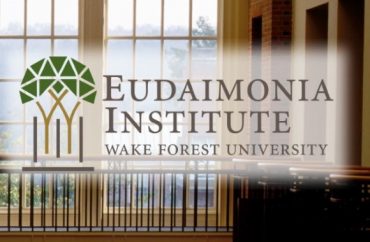
As professors at Wake Forest University continue to pass faculty senate resolutions against the 1-year-old Eudaimonia Institute, scholars at the Koch-funded center are moving forward with their studies focused on the nature of human flourishing.
Case in point: One day after a faculty senate resolution was approved last week that seeks to increase professors’ oversight on the private university’s donation policies, the Eudaimonia Institute hosted a two-day conference at the Winston-Salem campus that drew prestigious scholars from across the nation to weigh in on what it means to be happy and flourish.
“This conference aims to promote high-quality interdisciplinary theoretical and empirical research that develops a better understanding of eudaimonia, its determinants, and its institutional implications,” the event’s website states. “Eudaimonia is Aristotle’s word for ‘well-being,’ ‘happiness,’ or ‘flourishing.’”
Talks titled “Eudaimonia is Not Measurable Pleasure, But the Fruit of a Liberal Life” and “Just Action and Eudaimonia in Plato’s ‘Republic’” were among those given at the conference, which took place late last week.
Dr. James Otteson, an economics professor at Wake Forest and executive director of the Eudaimonia Institute, told The College Fix via email on Monday that the event was a success, adding the institute is moving forward with a positive outlook.
And Wake Forest spokeswoman Katie Neal told The College Fix earlier this month that campus support for the center is firmly established, that “an associate director and other staff have been hired and Institute support for faculty research into human flourishing is flowing.”
To what extent faculty gadflies, who bristle at the thought of a Koch-funded academic center on their campus, will continue to be a thorn in the institute’s side remains unclear.
Last week, the faculty senate voted 19-4 to approve two motions, both nonbinding, that asks the university to devise a conflict of interest policy that allows faculty to be involved in decision making. The second requested that faculty be involved in all decision making when it comes to accepting money from donors.
The measures were a far cry from previously approved resolutions that sought faculty control over the institute’s research and public statements and a defunding of Koch support from the center. Those demands appear to have gone nowhere.
Still, professors found reason to nitpick small details. One example is the objection that the Charles Koch Foundation* is not listed as a donor on the institute’s website. Faculty have yet to raise the same concern over other institutes at Wake Forest that do not list their donors.
Moreover, the institute website’s “news” section contains a link to the university’s press release that identifies the Koch Foundation as having given a large grant to Wake Forest for the Eudaimonia Institute. That link has been on the website since it was first created, early last fall.
Faculty members, in a report on the matter by an “Academic Freedom” subcommittee, also continued to express concern that the center is an attempt to infect the curriculum with free market ideas and convince students to support right-leaning political causes, even going so far as to call it “parasitical” and suggest the school’s accreditation could be on the line.
“Are there other foundations with political agendas? Of course. But we’ve encountered nothing comparable to this attempt to co-opt higher education — and all under the veil of secrecy,” Professors Jay Ford and Doug Beets wrote April 19 in a op-ed in the Winston Salem-Journal.
They claimed to have no beef with what they call the Koch Foundation’s “libertarian, free market and anti-government regulation agenda” but rather its alleged political goals.
“The Koch Foundation funds such institutes to ‘leverage’ higher education for ultimately political ends. Students are portrayed as cogs in a wheel of ‘grass roots’ political production,” the professors stated.
Supporters of the institute, including Koch representatives, have dismissed such rhetoric as an attack on academic freedom and inquiry.
“Whatever one may feel about the Charles Koch Foundation, those who believe in open inquiry on campus should be outraged,” John Hardin, director of university relations for the Charles Koch Foundation, wrote in a letter to the editor in The Chronicle of Higher Education.
“This group of faculty’s actions are aligned with others across a range of ideological perspectives who believe in silencing ideas with which they disagree,” Hardin continued.
“…At the Charles Koch Foundation, we join those who would stand up against such egregious restrictions on open inquiry, regardless of their source. Ad hominem attacks on the Charles Koch Foundation by the Wake Forest faculty behind this effort are one thing. The move to censor the ideas of faculty with whom they disagree is another matter entirely and one that all who care about higher education should resist.”
MORE: Wake Forest faculty vote to defund Koch-connected center, might censor it too
Like The College Fix on Facebook / Follow us on Twitter




Please join the conversation about our stories on Facebook, Twitter, Instagram, Reddit, MeWe, Rumble, Gab, Minds and Gettr.